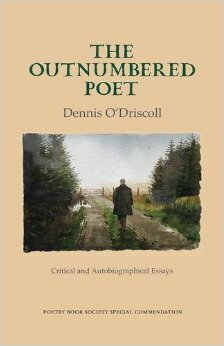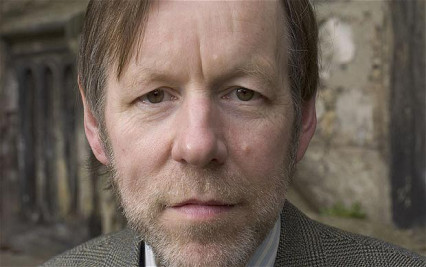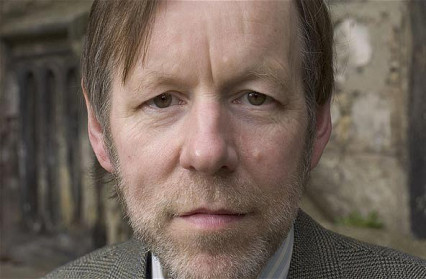Martina Evans casts a critical eye over The Outnumbered Poet by Dennis O’Driscoll. Available on Gallery Press.
 ‘I was never a great admirer of death,’ says Dennis O’Driscoll in a short piece entitled ‘In the Midst of Life’, first published in The Irish Times in 2001 and collected here in The Outnumbered Poet, his second collection of essays published posthumously by Gallery Press in 2013. Choosing a house ‘with close-up views of Victorian burial pyramids’ for sound practical reasons, he hopes it also might act as ‘aversion therapy’. One does not need to read many O’Driscoll poems to conclude that aversion therapy is something he practised all his life. And aversion therapy could also be called bravery: in his last collection, Update (Anvil 2014), O’Driscoll wrote his bravest and darkest poems. These poems and those from Dear Life (Anvil 2012) might seem prophetic but only if one has never encountered his poems before. His frequently anthologised ‘Someone’, which begins ‘someone is dressing up for death today’, comes from his collection, Kist (Anvil 1982) where the title poem itself, ‘Kist’ (1975) places a coffin centre-stage. Dennis O’Driscoll was casting a cold eye on life and death for at least forty years prior to his own demise.
‘I was never a great admirer of death,’ says Dennis O’Driscoll in a short piece entitled ‘In the Midst of Life’, first published in The Irish Times in 2001 and collected here in The Outnumbered Poet, his second collection of essays published posthumously by Gallery Press in 2013. Choosing a house ‘with close-up views of Victorian burial pyramids’ for sound practical reasons, he hopes it also might act as ‘aversion therapy’. One does not need to read many O’Driscoll poems to conclude that aversion therapy is something he practised all his life. And aversion therapy could also be called bravery: in his last collection, Update (Anvil 2014), O’Driscoll wrote his bravest and darkest poems. These poems and those from Dear Life (Anvil 2012) might seem prophetic but only if one has never encountered his poems before. His frequently anthologised ‘Someone’, which begins ‘someone is dressing up for death today’, comes from his collection, Kist (Anvil 1982) where the title poem itself, ‘Kist’ (1975) places a coffin centre-stage. Dennis O’Driscoll was casting a cold eye on life and death for at least forty years prior to his own demise.
One clue to this obsession may be found in one of the central essays in The Outnumbered Poet, ‘The Library of Adventure’, which starts amusingly in typical O’Driscoll style:
I was a fast reader who became a slow reader. I started in the fast-reading lane in the sense that I learned to read unusually young and was treated as a freak show for visitors to the Presentation Convent school in Thurles, where my schooling began. No guest…was spared…I read with the obsession of an addict in the grip of an uncontrollable urge.
His favourite reading position, ‘a large tea chest propped against the smooth bark of a mature laburnum’, the young O’Driscoll was aware that no matter how much he read he would never catch up with all the books he wanted to read and he never lost that ‘sense of urgency’:
It was as if reading was childhood itself, as if I sense my days under the pendulous laburnum, with everything coming up smelling of roses, were numbered. Time was running out. Evenings crumbled too quickly into red-skied night. Relatives were quizzing me with increasing eagerness about what I would do when I left school.
And what Dennis did when he left school is what these essays are all about. Meeting and reviewing poets, working as a civil servant, casting a cool and amused eye on the behaviour of the small community of poets – the blurb culture (skewered devastatingly in ‘Blurbonic Plague’), the hype and the cronyism. In 1970, Dennis took a job with the revenue commission and perhaps there is another clue to his preoccupation with death in the autobiographical piece, ‘Working Bard’:
And another truism – the one about the universality of death and taxes – soon acquired a special, indeed literal significance for me. Death, after all, was what would earn me my living; death in form of taxes, actually: death duties and inheritance tax.
‘Someone is dressing up today…’ comes to mind again; what makes this collection riveting is the connections between the essays, the reviews and the poetry. Twelve years on from his substantial, acclaimed Troubled Thoughts, Majestic Dreams, The Outnumbered Poet is even more dense and rewarding as O’Driscoll mines the same preoccupations with even more panache and depth.
The spirited title essay gives a detailed and often hilarious overview of the good, the bad and ugly side of poetry readings; it ranges from George Mackay Brown’s imaginings of medieval bards in Orkney to present-day performance poets. As poetry festivals burgeon and performance poetry explodes, O’Driscoll urges us to remember Larkin’s warning not to rely on the vocal rendering of poems alone when ‘the eye as well as the ear is a receiving station for poetry…an entire architectonics has evolved encompassing the space around the word on the page…’ He wonders too if readings are not a waste of time, that poetry readings may replace new poems the poet might have written if he stayed at home. But he does celebrate readings in the following essay, ‘Readings Remembered’, and again here in the title essay, stating that when in ‘idealistic moods’:
I like to think – consciously or not – every time we attend a reading, we are confirming our commitment to poetry as a source of verbal fascination, a force for civilization, a fount of revelation, allowing access to language so nuanced as to be capable of even audibly registering gradations of silence.
But those ‘idealistic moods’ prove unsustainable as O’Driscoll wonders whether we might be better off ‘to bolt the door, lie low and cancel the baby sitter… rather than squander our time and patience… where vacuous and fatuous poems are read slickly and soulfully…’ He concludes:
Nonetheless, the most important, consistent and trustworthy voice in poetry remains a silent one: the voice we hear in the inner ear when, alone, and free from the pressures of communal conformity, we read and react for ourselves and – in an unmediated meeting of minds on the printed page – catch that undefinable sound which Thomas Lux has striven to define:
It’s the writer’s words
of course, in a literary sense
his or ‘her’ voice but the sound
of that voice is the sound of your voice…
caught in the dark cathedral
of your skull, your voice heard
by an internal ear formed by internal abstracts…
The voice you hear when you read to yourself
is the clearest voice: you speak it
speaking to you.
The subject of Creative Writing raises its head in an O’Driscoll essay not for the first time. It was clear in Troubled Thoughts, Majestic Dreams (Gallery Press 2001) that O’Driscoll has serious reservations about graduate programs:
Some of the most vibrant poetry in Creative Writing is being written by teachers of creative writing; the notion of poetry originating almost exclusively in a university environment is no more palatable – and no less dangerous – than the over-dependency of farmers on one or two strains of high-yield wheat for the grain harvests of the Great Plains. It would be a disaster for poetry if its weedier cousins – rap and slam – were to be the only organic alternatives to the workshopped crop.

Elsewhere he talks of poetry ‘becoming an increasingly parthenogenetic art in which poets earn their living by producing new poets.’ A curious outsider who had neither taken nor given a creative class in his life, O’Driscoll is able to view the practice with a harder more cynical eye than other more dependent poets. He speaks of American poets who if ‘they experience Bohemia, it will be as a country – visited on a grant or fellowship – from whose bourne the traveller returns with an album of exotic poems, ideal ballast for his or her blurb-encrusted, award-bestrewn collection.’ In ‘The Library of Adventure’ he worries that Creative Writing students in universities are ‘being taught to treat great poems as plastic bones on which aspirant writers can cut their creative teeth’. This seems rather harsh, as I know from my own experience that many students who come to classes are genuine readers. Indeed, the best students are always the best readers. And for those wannabes who do not read, they can not improve until they do. If Creative Writing courses can teach students to read with attention and even if this is perhaps all that can really be taught – who better to learn from than the masters? – then I think O’Driscoll, a rare and wonderful reader himself should approve.
If an outsider when it comes to Creative Writing, O’Driscoll is an insider in the tiny, often suffocating world of poetry and he is not afraid to express his mistrust of a community where ‘very little happens now without stage management of some kind’. In ‘Troubled Thoughts’ he laments that ‘books are no longer sent out for review, they are sent out for praise’. The fact is that O’Driscoll can be trusted to review and discuss ‘in more spontaneous ways, less conniving…’, and in doing so he truly celebrates poets as well as the poetry to which he devoted his life. In his fine review of the poetry of Kay Ryan he states:
However much (as Ryan knows only too well) its little monarchs may prefer it to be an exclusive club, poetry is – like Robert Frost’s notion of home – ‘the place where, when you have to go there,/ They have to take you in’.
There are many essays here on individual poets – Irish, British, American and European. ‘Peter Fallon Revisited’ made me revisit Fallon’s poetry again with renewed excitement and appreciation. His extensive review of Michael Hartnett’s life and work is masterful. In fact, every single essay sent me back to the poet in question – so much so, that I feared I would never finish the book in time to write the review. ‘When Ronald Met Czeslaw’ – an essay about R.S Thomas and Milosz and their meeting in Dublin – gives us a wonderful example of O’Driscoll’s observational powers and the sharp fiction writer he might have been. He waits with his wife, the poet Julie O’Callaghan, for the arrival of R.S. Thomas at the Dun Laoghaire ferry port:
…the bored harbour policeman ignores the torrent of words oozing from the machine. The Hertz clerk is idly clicking a staple gun. The young woman at the Bord Failte tourism desk practices a pitch-perfect, eavesdrop method of speaking to her boyfriend on the phone. Her responsible expression is intended to convey that she is engrossed in company business; but the duration of the call and an occasional bird-like eye-swivel – as though checking for territorial threats – convey a different story.
The Outnumbered Poet contains some great essays on particular themes. ‘Saying What Happened’ is a cool, intelligent look at the confessional poetry of a number of poets, Lowell and Berryman and an especially appreciative look at Michael Hofmann’s poems about his father: ‘Dense, intense, brisk and gnarled – crackling with macaronic coinages and dry asides’.
‘The Widow’s Tale’, an in-depth study of women poets in mourning, begins with an account of the origin of the Irish caoineadh or lament and, in particular, the magnificent eighteenth-century ‘Caoineadh Airt Ui Laoighaire’ (‘Lament for Art O Leary’) by Eileen O’Connell, moving on to present-day poets with in-depth looks at Elaine Feinstein, Penelope Shuttle, Ruth Stone and Rita Ann Higgins among others. The analysis of Shuttle and Feinstein is particularly satisfying.
‘Plumping For Poetry’ is an eloquently amusing look at heftier poets like Ben Jonson, Les Murray and B. S. Johnson, ending with a close examination of Kay Boyle’s long poem, ‘Poets’, where Boyle ‘really does appear to be as appalled by overweight poets as she was by dictatorial and warmongering politicians’.
The last section of this volume contains a comprehensive look at Heaney’s work and writings, in particular, the public nature of Heaney’s poetry especially after he received the Nobel Prize in 1995 when in Heaney’s own words ‘The supporters…invaded the pitch’. ‘Lux Perpetua’, O’Driscoll’s review of Heaney’s ‘Electric Light’, makes rich connections with Heaney’s previous collections – how they all fit together and in particular ‘Electric Light’s’ predecessor, ‘The Spirit Level’.
It is impossible to cover everything this collection has to offer in one review. Borges – quoted on the subject of books in ‘The Library of Adventure’, ‘I shall die before I come to the end of them’ – said that good readers are much rarer and blacker swans than good writers. O’Driscoll is that rare black swan and every essay in The Outnumbered Poet is a master class on how to read poetry. For those Creative Writing students cutting their teeth on the ‘plastic bones of great poems’ and indeed all fans of poetry and Dennis O’Driscoll in particular, I whole-heartedly recommend these essays. O’Driscoll always says more than can be absorbed in one reading. He bemoans in the ‘Library of Adventure’ – ‘no book is ever finished, only abandoned’. I’m not finished with this book but it was only by abandoning it that I could find the time to write this review.











